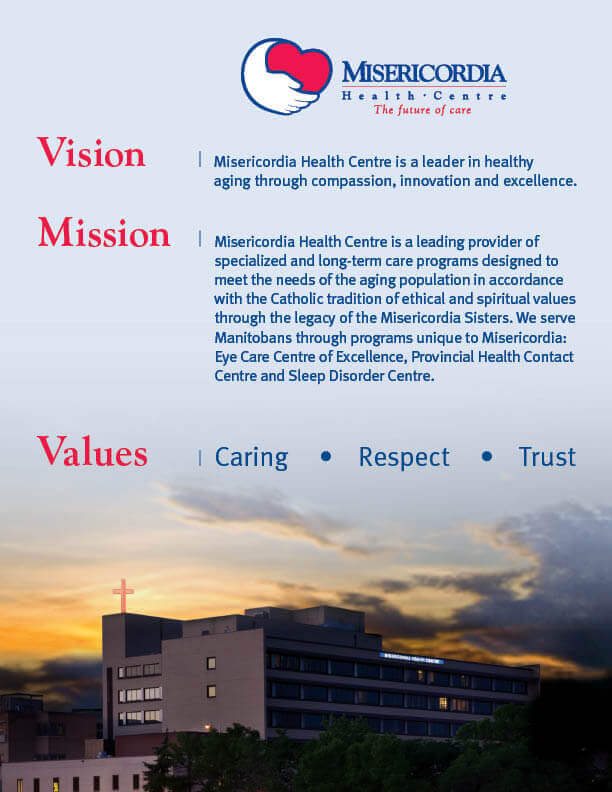Author: Heidi Klaschka
Kristine Harbottle, Community IV Program
Kristine Harbottle, Community IV Program
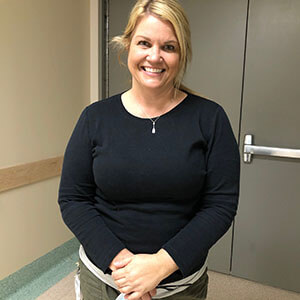
The COVID-19 pandemic is changing our world and health-care professionals are on the front lines.
As a nurse working in the Community IV Program at MHC, Kristine Harbottle feels the threat of COVID-19 follows her home. Her strategy is to shower as soon as she gets there.
“Then I can go near my family,” she said.
“It’s stressful for the family, my kids and my husband…it’s scary for people.”
The Community IV Program is a service for people who require prescribed intravenous antibiotics in a clinical setting. Up to 70 people attend MHC for the treatment each day, and Kristine also does home visits for people too sick to attend the clinic. The treatments are for bodily infections requiring IV antibiotics—but not for COVID-19.
“We give the antibiotics and we’ll do the wound care,” Kristine said, adding an Infectious Disease doctor is also part of the patient care.
Patients and staff are now screened for signs of COVID-19 before entering the health centre, Kristine said.
Community IV Program staff have always been vigilant about hand washing and keeping spaces clean and equipment sterile, but now they’re being even more cautious and wearing masks and eye protection.
“Right now, I’m talking with my mask on,” Kristine said over the phone.
And of course, even though they are performing an essential service, they still have to eat. COVID-19 hasn’t spared that process either.
“We have a small lunchroom, so we have staggered all of our lunch breaks because we’re trying to keep six feet apart.”
Keep COVID-19 informed by visiting: covid19manitoba.ca
#mhcfamily #healthcareheroesMB #COVID19
Melissa Zepp, Infection Prevention & Control
Melissa Zepp, Infection Prevention & Control
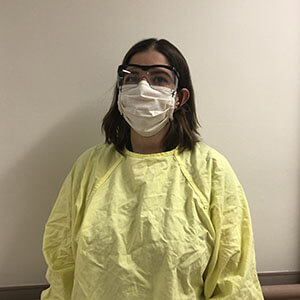
The COVID-19 pandemic is changing our world and health-care professionals are on the front lines.
Melissa Zepp’s job title at MHC depends on who you ask.
“Infection control professional,” says Melissa, “or you could just say ‘germ cop,’ that’s what my son calls me.”
Germ cop – and teacher. A lot of what Melissa is doing around the health centre these days, beyond infection control “surveillance,” includes education. And calming nerves.
“The majority of what I do when it comes to COVID-19 is dispelling some of the myths…reducing anxiety about how things are spread and talking about the evidence.”
It’s much the same as she did pre-COVID-19, but more of it.
“I’m a whole lot busier. My pager goes off like wildfire. I’m spending a significant more time doing education.”
One result of COVID-19 is people are more interested in what she has to say, and some of those people are learning basic facts—like, how the virus can spread.
“You can’t absorb the virus through your skin,” explains Melissa. The virus primarily enters through your eyes, nose and mouth.
“If you touch stuff other people have touched, wash your hands before touching your face.
“Really, don’t touch your face,” says Melissa. “And if you have to touch your face – wash your hands first.”
Everyone can protect each other by following COVID-19 precautions:
- Wash your hands often with soap and water for at least 20 seconds
- Social distancing (keep two metres apart)
- Cough or sneeze into a tissue or your elbow (not your hands)
- Avoid greetings that involve touching, like handshakes
Keep COVID-19 informed by visiting: covid19manitoba.ca
#mhcfamily #healthcareheroesMB #COVID19
April 2020 Newsletter
Vera Duncan, Nursing Services
Vera Duncan, Nursing Services
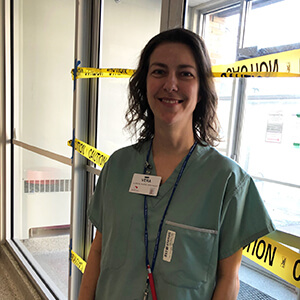
The COVID-19 pandemic is changing our world and health-care professionals are on the front lines.
“These days I’m basically running between three entrances, making sure people are entering Misericordia in the safest way,” says Vera Duncan, clinical nurse specialist.
Vera wears a lot of hats at MHC: she is the advanced wound-care clinician and also facilitates research and clinical education for staff to optimize patient care.
Pre-COVID-19, Vera was working on several projects across the health centre. Nowadays she is the clinical lead on the visitor screening at the three entrances at MHC.
At every entrance, visitors and staff are first asked to use
hand sanitizer, then the door screener asks a series of questions before access
is granted to the building.
“If anyone says ‘yes’ to screening questions, they’ll have to put on a mask and
go to one of the isolation rooms,” says Vera. Door screeners call Vera and the
clinical response team (CRT) for assessment.
Vera’s overall goal is to determine how everyone can enter safely – safe for them and safe for everyone on site.
“The protocols change daily, sometimes hourly,” she notes. Vera and her team, which includes nurses and non-clinical staff, have to stay on top of current procedures and best practices.
“More recently we are screening staff and taking temperatures. This has required new training for even more staff.”
Over the
last two weeks, Vera has trained 25 nurses to help with door screening and dozens of screeners in the screening protocols,
taking temperatures and Personal Protective Equipment (PPE).
“It’s not just about asking the screening questions, it’s about applying
critical thinking.”
Keep COVID-19 informed by visiting: covid19manitoba.ca
#mhcfamily #healthcareheroesMB #COVID19
Stacey Morgan, Transitional Care
Stacey Morgan, Transitional Care
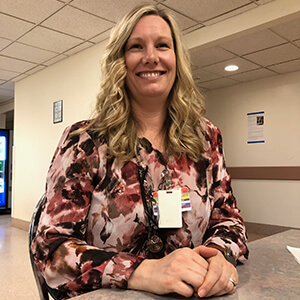
The COVID-19 pandemic is changing our world and health-care professionals are on the front lines.
Stacey Morgan manages about 40 health-care aides and nurses who care for 44 Transitional Care Unit (TCU) clients who come to MHC primarily from acute-care sites for some restorative care before transitioning to other places, which could include their homes or another facility. MHC has three TCUs.
Stacey says her staff are talking a lot about COVID-19, and they fear the unknown.
“I think it brings fear of one of the staff or patients getting ill (with COVID-19), and what that would mean.”
Stacey says a lot of education, reassurance, answering questions and making sure they have appropriate personal protection equipment helps. So far, the virus has not shown up at the health centre.
The biggest difference for the transitional care units is that no visitors are allowed.
But spirits are lifted by helping clients have special moments communicating with family with a video call on an iPad. The unit has just one iPad for 44 clients to share, Stacey says, and the Misericordia Health Centre Foundation is hoping generous donors will help them purchase more.
“We’re doing whatever we can to prevent social isolation,” says Stacey.
And her staff are taking extraordinary steps to help people connect.
“Last week one of our clients was turning 86,” Stacey recalls, “so our staff gave him a cell phone and brought him downstairs in front of the large windows overlooking the river.
“He was able to see his wife and daughter through the glass and speak to them: it was a wonderful thrill for him and his family.”
Keep COVID-19 informed by visiting: covid19manitoba.ca
#mhcfamily #healthcareheroesMB #COVID19
Candace Blundell, PRIME
Candace Blundell, PRIME
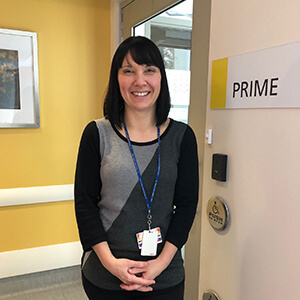
The COVID-19 pandemic is changing our world and health-care professionals are on the front lines.
PRIME case manager Candace Blundell is digging deeper during the COVID-19 pandemic to ensure her clients are taken care of.
MHC’s PRIME program usually cares for 70 clients with complex needs, and sees up to 40 clients each day. Because of physical distancing requirements they’ve had to cut that number down to 10 and increase the after-hours outreach visits to make sure people are still being taken care of.
“Many clients have no family, so we look to see who might miss extra care if we don’t see them once a week,” said Candace.
The reduction in day clients means some of PRIME’s staff—including nurses, doctors, physiotherapists, health-care aides, dietitians and rehabilitation assistants—are helping in other areas of the health centre.
It’s been hard, Candace says, to continuously reassess and prioritize clients who need the most care—whether it’s care for wounds or their mental health—and determine the list of 10 who will come for care at MHC.
“COVID-19 is making that very challenging. It’s a constant reassessment, but so far, it’s worked well. There is always support available 24 hours a day if our clients need us.”
Families are grateful to PRIME staff for looking out for their loved ones—sometimes the only people who can during this time. And those loved ones are very appreciative of the support, which can include picking up groceries and delivering to clients’ homes.
“That’s what makes PRIME so different and unique. As a case manager, it’s whatever our clients need. Anything. And everybody really appreciates any sort of contact at this point.”
Keep COVID-19 informed by visiting: covid19manitoba.ca
#mhcfamily #healthcareheroesMB #COVID19
Nursing students provide ‘vital work’, join Health Links in fight against COVID-19
Seniors home seeks iPads to help visitors bridge the COVID-quarantine gap
Joan Crabtree, Spiritual Health
Joan Crabtree, Spiritual Health
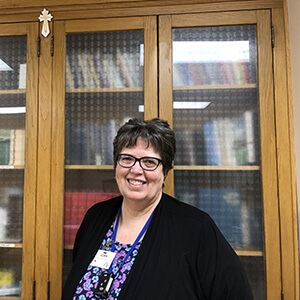
The COVID-19 pandemic is changing our world and health-care professionals are on the front lines.
There’s an increasing demand for spiritual health services amongst those who call Misericordia home.
“People are scared and uncertain,” says Joan Crabtree, lead spiritual-health provider at Misericordia Health Centre.
Very simply put, Joan describes spiritual health as: “How you find meaning and purpose in life.”
While COVID-19 has changed the offerings of the spiritual health department at Misericordia, Joan and her team are working tirelessly to meet the spiritual-health needs of residents and clients.
“We’re doing a lot more one-on-ones, acknowledging it’s normal to feel anxious, scared, lonely. And from there, we’re exploring where [residents] can find encouragement – whether it’s prayer, music or calling family.”
Alongside one-on-one meetings and discussions with residents, Nurturing the Spirit – a conversational group program – is still running. However, the capacity has been decreased and the room where it takes place has been spaced out, to ensure appropriate social distance measures.
Despite looming uncertainty, Joan notes there are some really positive things happening in the world right now including: “People are reaching out and talking on the phone with others they haven’t connected with in a long time.”
Connection and belonging are major parts of spirituality. “Everyone can discover their own sense of spirituality, regardless of religion, race, creed or otherwise,” says Joan. “It’s acknowledging there’s something bigger than us. That’s a powerful realization of COVID-19 – we’re all in this together.”
Keep COVID-19 informed by visiting: covid19manitoba.ca
#mhcfamily #healthcareheroesMB #COVID19

